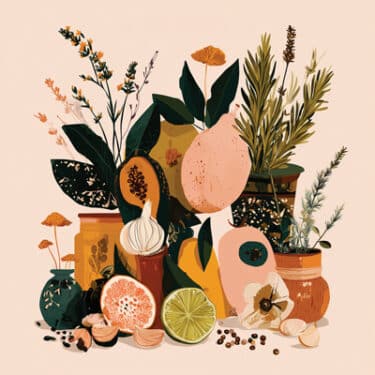How cultures around the world use food to promote health
Fact checked by Shannon Sparks
Chef Atzimba Perez left her home in Michoacán, Mexico, 30 years ago to start a catering company in Chicago. By using traditional recipes and hiring chefs from Mexico, Perez ensures her pre-Hispanic identity lives on in the United States. Through food, she has found a way not only to preserve culture, but also to promote health.
“Food is not only to satisfy necessities in your body,” Perez says. “It is for a connection with Mother Earth and our ancestors.” In pre-Hispanic culture, food was considered essential for mental, spiritual, and physical health.
“I use a lot of herbs like rosemary, parsley, oregano, dried chile,” she says.
Perez also incorporates ingredients that predate Spain’s colonization of Mexico. The pre-Hispanic grain amaranto — or amaranth in English — is rich in vitamins, protein, calcium, iron, phosphorus, and fiber. It also offers anti-inflammatory benefits. Huitlacoche, a fungus that grows on corn, was another important nutritional staple in pre-Hispanic diets, rich in carbohydrates, protein, fat, vitamins, and minerals.
While passionate about food as a form of preventive and holistic medicine, Perez also adapts her ancestral recipes to the mental and physical needs of her community. “Especially now, it’s a very difficult time — not only for the immigrants, but also for the old people.
I need to do something,” she says.
Perez often brews teas with rosemary and lavender, which she says calm the mind and soul during times of emotional unrest. She is committed to sharing these traditions to support healing in immigrant communities. During the Covid-19 pandemic, Perez appeared on news network Telemundo to share natural remedies for respiratory issues with ingredients such as garlic, honey, red onion, and lime juice.

“Nigerians tend to believe that certain concoctions are essential for improved health and healing,” Alonge-Oludaye says. “One that predominated my childhood was called agbo jedi, which is meant to help with constipation and any problems with bowel movements.”
She recalls an herbal drink her mother prepared — mixing unblended cloves with water and letting it ferment for an extended period — to soothe stomach aches. Guava, mango, and soursop leaves are also commonly used in Nigerian healing traditions.
While Alonge-Oludaye doesn’t consume these remedies daily, she says her mother always keeps the ingredients on hand. Social media helps her mother stay connected with other Nigerians and continue exchanging traditional knowledge.
“To this day, my mom always makes sure to make herbal remedies when I come home from college,” Alonge-Oludaye says. “These remedies hold a significant place in my heart and are very symbolic of the love my mom has for my siblings and me. They are one of the cultural practices I plan to continue throughout my life.”
For both Alonge-Oludaye and Perez, food is not only medicine but also an essential aspect of cultural identity. Chicago-based dietitian Aizya Ali-Mohammed works at Healthier Tomorrows, a nutrition care practice where she focuses on this emotional connection to food in her work with clients.
“Engaging individuals by sharing their food narratives, including cherished memories and traditions associated with food, is essential for delivering client-centered care,” Ali-Mohammed says.
Ali-Mohammed’s client base is primarily African Americans and members of the Black diaspora. Her own roots trace back to a rural region in the Deep South. She prioritizes cultural competence in her practice, tailoring nutritional advice to align with her clients’ lived experiences and traditions.
“For example, emphasizing the significance of nutrient-dense soul food staples — such as savory okra and tomatoes rich in fiber and vitamin C, vibrant succotash that provides plant-based protein, or warm salmon patties rich in heart-friendly fat — can enhance this connection.”
Ali-Mohammed also honors cultural foods when clients have questions about evidence-based eating patterns. When discussing the research supporting the Mediterranean diet, she works with clients to adapt the diet’s overall principles to their traditional cuisines, emphasizing flexibility across cultures.
“These parameters and the associated positive health outcomes can be applied to any cultural food traditions, making it fun to promote a plant-forward diet, whether you’re a kale enthusiast or a collard greens fan, a garbanzo bean connoisseur or a black-eyed peas lover,” she says.
Judith Bowman, MD, a family medicine physician with Mensah Medical in Lisle, Illinois, specializes in biochemical imbalances and agrees that there’s no one-size-fits-all approach to nutrition. Bowman uses specialized biochemical testing to identify patients’ imbalances and inform treatment.
“Just like biochemical individuality, there are diets that best fit an individual’s needs,” she says. While Bowman acknowledges the nutritional value of culturally significant ingredients — such as turmeric and curcumin in South Asian diets — she advocates for personalization within and across cultures.
After all, ethnic diversity is a hallmark of the United States. Diverse food traditions not only support biological health but also build mental, familial, and cross-cultural well-being.
While Chef Perez gives back to Chicago’s Hispanic community through her Mesoamerican dietary practices, Alonge-Oludaye preserves her connection to Nigeria by continuing her family’s herbal traditions. Their work demonstrates that ancestral ingredients extend beyond cultural identity to encompass broader aspects of health and history.













